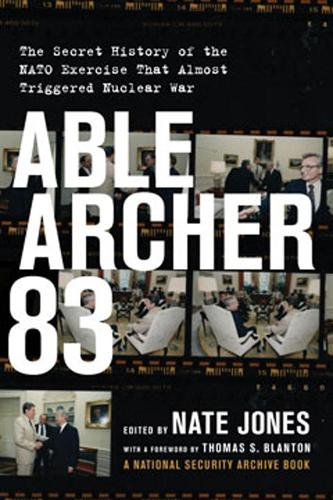
Able Archer 83: The Secret History of the NATO Exercise That Almost Triggered Nuclear War
(Hardback)
Publishing Details
Able Archer 83: The Secret History of the NATO Exercise That Almost Triggered Nuclear War
By (Author) Nate Jones
Foreword by Thomas S Blanton
The New Press
The New Press
1st February 2017
United Kingdom
Classifications
General
Non Fiction
Nuclear weapons
Arms negotiation and control
355.52094090
Physical Properties
Hardback
320
Width 156mm, Height 235mm
Description
In November 1983, Soviet nuclear forces went on high alert when intelligence reported alarming activity on US bases. In response, the Soviets planned for a nuclear strike by NATO on Eastern Europe. And then Able Archer 83, a vast NATO war game exercise, ended. What the West didn't know was that the Soviets thought Operation Able Archer 83 was real and were preparing for a surprise missile attack from NATO. This close scrape with Armageddon was unknown until 2015, when the US released an analysis. Able Archer 83 vividly recreates the atmosphere that nearly unleashed nuclear war.
Reviews
Praise for Able Archer 83:
"Twenty-one years after the Cuban Missile Crisis, a NATO exercise, Able Archer 83, came terrifyingly close to precipitating an accidental nuclear war. Nate Jones's brilliantly researched and gripping history of government miscalculations and misjudgments on both sides of the iron curtain during this war game, poses the 21st century's most serious existential question: How many nuclear bullets can humanity dodge Read it and reckon! I don't think you will like the answer."
Martin J. Sherwin, University Professor of History at George Mason University and author of A World Destroyed: Hiroshima and Its Legacies
"Able Archer 83 is an invaluable resource on one of the most dangerous moments of the Cold War. The book contains an unmatched collection of previously secret documents about the War Scare of 1983 and the Able Archer exercise at the center of it. If you want to learn from history, this is the place to start."
David E. Hoffman, author of The Dead Hand: The Untold Story of the Cold War Arms Race and Its Dangerous Legacy
"Able Archer 83 brings us back to a moment when we all came close to becoming cinders or radioactive corpses. It's an important contribution to our understanding of how the Cold War played out, and how erroneous assumptions routinely become institutionalized policy, which then becomes almost irresistible."
Glenn L. Carle, a former CIA officer and author of The Interrogator
Author Bio
Nate Jones is the director of the Freedom of Information Act Project for the National Security Archive. He is also editor of the National Security Archive's blog, Unredacted. He lives in Washington, D.C. Thomas S. Blanton is the director of the National Security Archive at George Washington University in Washington, D.C.
